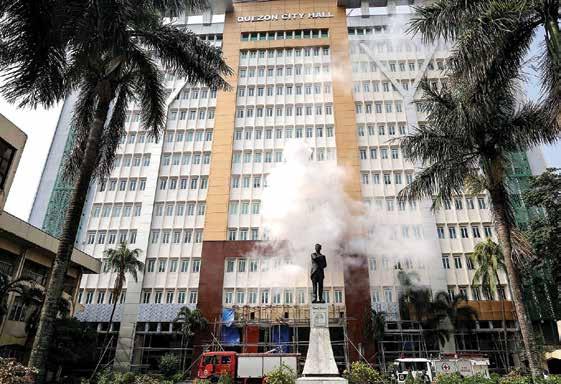
4 minute read
INTERPOL’s
MANILA — The Bureau of Immigration said on Friday, June 9 that INTERPOLs declaration of a "global human trafficking crisis" involving networks of scam syndicates reflects the escalating problem of Filipinos being trafficked through false job postings.
Echoing the international crime organization’s warning that the regional problem of trafficking has blown up to a global scale, BI Commissioner Norman Tansingco said the problem is “both severe and complex" that requires not just government action.
Advertisement
Preventing the trafficking of Filipinos needs the “collaborative efforts” of law enforcement agencies, nongovernmental organizations, intelligence units and the private sectors, Tansingco said.
This is because INTERPOL has found that the “Modus Operandi (MO)” is “escalating rapidly” and “taking on a new global dimension,” with criminals using more sophisticated techniques like Artificial Intelligence tools.
“To address this increasingly global threat, INTERPOL is calling for greater intelligence exchange between law enforcement, nongovernmental organizations, financial intelligence units and relevant private sector companies to support the rescue of trafficking victims and dismantle the money laundering activities that facilitate these activities,” the organization said in a statement on Wednesday, June 7.
The INTERPOL notice described the rise of online scam centers as a "doubleedged crime threat” that victimizes both the trafficked individuals and a second set of victims targeted by online fraud.
“The trafficked victims endure forced labor, extortion, physical and sexual exploitation, and even organ harvesting. Simultaneously, the online scam centers perpetrate various fraudulent activities, such as investment scams, romance scams, and cryptocurrency-related fraud,” the BI said.
In March, the immigration bureau said it had noted an increase in the number of young professionals—even "those with good travel records, gainfully employed and are graduates of good
Ople said the new rules also provide a list of 20 "cardinal sins" that may lead to the cancellation of a recruitment agency's license.
The list of serious offenses was drawn up in consultation with various stakeholders, she added.
The list covers acts of graft and corruption including attempts to bribe DMW officials and personnel and to recruit and deploy minors and underaged workers.
"Now that the rules are simpler, the do's and don'ts are also now clearer for the recruitment agencies. They don't have to look for 'padrino' (godfather) inside and outside the department. Just avoid committing the 20 cardinal sins and deal with the workers and employers properly," Ople said. She added that the simplification of the rules was one of the directives issued by President Ferdinand Marcos Jr. during his State of the Nation Address last year.
The new rules issued by the DMW are also a product of extensive consultations with all stakeholders under the principle of social dialogue and tripartism, Ople said.
The result is a set of balanced and simplified rules adhering to day-to-day operations and concerns of OFWs, she added.
Licensed recruitment agencies are now required to employ a full-time and trained welfare desk officer who will monitor and assist in the resolution of workers' problems and complaints at their job site.
For the first time, the rules on OFW recruitment also seek to regulate the accommodations of recruitment agencies for its workers, Ople said.
"This is significant because there was no way for the government to know where these accommodations are and how conducive their facilities are for our workers. Under the new rules, they would have to inform us about the location and capacity of these accommodations," she added.
Moreover, the new DMW rules impose a simplified and standardized penalty structure for private recruitment agencies for offenses such as involvement in corrupt activities and any conduct of illegal recruitment and trafficking in persons.
For serious offenses, an agency faces cancellation of its license, while less serious offenses will result in suspension
SOUTHERN CALIFORNIA REGIONAL RAIL AUTHORITY IFB No. MTL2305259
Railroad Frogs
The Southern California Regional Rail Authority (SCRRA) is seeking quotes for Railroad Frogs. Bid documents may be obtained at https://metrolinktrains.com/doing-business (free registration). Electronic Bids are due at 2:00 P.M. (PT) on 6/21/2023.
For further information, contact Arisa Hicks, Contract Specialist, at (213) 452-0250 or hicksa@scrra.net
6/10/23 of six months to one year. Agencies with light offenses will face suspensions of one to six months.
The new rules extend the validity period of provisional licenses from two years to three years and regular licenses to six years from the previous four years.
The DMW has also shortened its process-cycle time from 15 days to seven to 10 days on onsite accreditation and verification in its Migrant Workers Offices overseas.
Meanwhile, representatives of various recruitment agencies pledged to comply with the newly launched rules by signing a wall of pledges.
LOS ANGELES COUNTY METROPOLITAN TRANSPORTATION AUTHORITY (LACMTA) REQUEST FOR PROPOSAL
LACMTA will receive Proposals for PS87481 - Metro Leadership Academy at the 9th Floor Receptionist Desk, Vendor/Contract Management Department, One Gateway Plaza, Los Angeles, CA 90012.
A Pre-Proposal conference will be held on Friday, June 16, 2023, 10:00 a.m., at One Gateway Plaza, Los Angeles, CA 90012, Virtual Meeting: Online. All Proposals must be submitted to LACMTA, and be filed at the reception desk, 9th floor, V/CM Department, on or before 10:00 a.m. Pacific Time on Tuesday, July 11, 2023. Proposals received after the above date and time may be rejected and returned unopened. Each proposal must be sealed and marked Proposal No. PS87481. For a copy of the Proposal/Bid specification visit our Solicitation Page on our Vendor Portal at https://business.metro.netor for further information email Manchi Yi at yim@metro.net.
6/10/23
CNS-3708132# schools"—being deceived by cryptocurrency scams abroad that advertise false promises of high salaries.
ASIAN JOURNAL (L.A.)
Trafficking
victim lured by Facebook ad
The immigration bureau said that one 26-year-old Filipino who was illegally recruited to work in Thailand applied for a fake job posting advertised through Facebook.
The male Filipino victim was offered a salary of P40,000 a month and left the country in May “in the guise of being a tourist.”
“Upon repatriation, he admitted that he was recruited to work in Thailand through an ad he saw on Facebook and was contacted on Telegram by a Chinese national,” the bureau said in its statement.
Upon arrival in Thailand, he was transferred to Laos without his consent, which made him seek assistance from the Philippine Embassy, the bureau said.
“This is something we see almost every day. Professionals coming from good backgrounds being victimized by this huge syndicate. We have sounded the alarm on this since last year,” Tansingco said. (Cristina Chi/Philstar.com)








